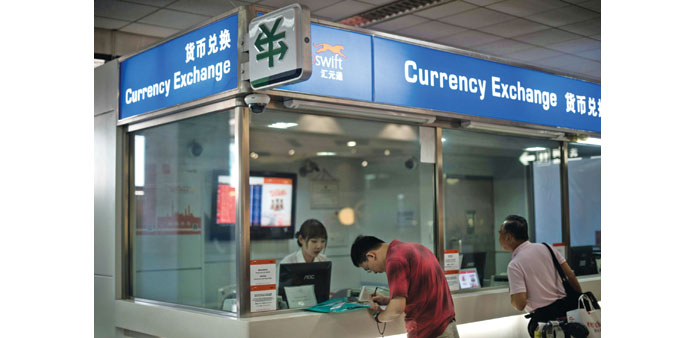A man changes foreign currency into Chinese yuan at a currency exchange office in Hongqiao airport in Shanghai. Reeling from a shock yuan devaluation few saw coming, emerging market strategists at the top banks are wary of making definitive calls on what 2016 might bring.
Bloomberg
New York
Reeling from a shock yuan devaluation few saw coming, emerging-market strategists at the top banks are wary of making definitive calls on what 2016 might bring.
Strategists from JPMorgan Chase & Co to Morgan Stanley say there are no guarantees of a recovery as the protracted suffering of developing-market assets is not over. Reluctant optimists at Bank of America Corp and Credit Suisse Group see the potential for emerging markets to outperform global equities in the second half of the year.
A mix of pitfalls and unknowns await investors in a year where the speed at which the Federal Reserve raises interest rates and China’s ability to avert a sharp slowdown have markets on edge. Add to the uncertainty, the geopolitical risks in the Middle East and Russia along with the political instability ensnaring Brazil.
“Everyone is more cautious going forward because there was so much volatility in 2015, most of which so many people got wrong,” Alberto Ades, Bank of America’s co-head of global economic research, said by phone on December 15. “Even if 2015 had proved to be a relatively smooth year - which it wasn’t - 2016 objectively has significant risks.”
When it comes to deciding which non-Chinese country will be the least-worst trade Mexico, India and Taiwan emerge as favourites over South Africa, Brazil and Thailand. Trade calls made in 2016 outlooks are much more nuanced, technical and inconclusive than those made for 2015.
So did banks get anything right about this year? No major bank predicted China’s sudden devaluation of the yuan in August, although Citigroup came the closest.
Its December 1, 2014 note warned about the country’s high vulnerability to deflation and suggested investors keep a close eye on capital outflow from China as “a theme worth monitoring.” Citigroup forecast an 8% return in 2015 for the MSCI Emerging Markets Index.
JPMorgan expected the Fed to hike three times in 2015 starting late summer, and another six times in 2016.
It also called for a 10% advance to 1,100 in the developing-nation stocks gauge. Goldman Sachs Group forecast a 7% return from the index, while recommending investors stay overweight on China because “valuations have discounted much of the macro headwinds and the recent cut in benchmark interest rates may buoy growth in the near term.”
The MSCI index has lost 16% so far this year, closing at 798.59 on December 17. In short: No one really got much right about this year.
Looking ahead, here is what some of those chastened banks see on the currency front.
Goldman Sachs favours Russia and Mexico, which rebalanced their current accounts, over Chile and South Africa, which are expected to see further downside from falling commodity prices, according to its December 4.
Morgan Stanley likes the Indian rupee and the Philippine peso, according to its 2016 Global EM Fixed Income Outlooks. Its credit of choice is Indonesian, Argentinian, Serbian and Mexican bonds over South African, Turkish, Chilean and Romanian securities.
Citigroup maintained risks of further capital outflows from China must still “be taken seriously since it is very difficult to call an end to the weakening of EM FX markets in recent years,” according to its own emerging-markets macro and strategy outlook for 2016.
Turning to stocks, banks appear more upbeat. Credit Suisse predicted on December 1 that the benchmark MSCI Emerging Markets Index will increase 15% to 960.
Go overweight on China, South Korea, India, Mexico, Malaysia and Turkey, and underweight on Brazil, Russia, Thailand, the Philippines and Poland, the bank recommends.
“The worst is behind us,” for both currency weakness and declining profit margins, the note said. “Moreover, we believe the impact on emerging-market equities and currencies from the forthcoming Federal Reserve monetary policy normalization is mostly priced in.”
Bank of America in its year-ahead note said 2016 was bound to be better for emerging markets as commodity prices were likely to stabilize and China would skirt a much-feared hard landing.
UBS in its outlook warned that one year is not enough to recover fully from the volatility of 2015 as more dangers lurk in the horizon.

